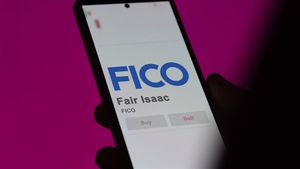Financial News
International Paper Maintains Quarterly Dividend Amidst Strategic Shifts and Payout Ratio Scrutiny

NEW YORK, NY – October 13, 2025 – International Paper (NYSE: IP) today announced its regular quarterly dividend of $0.4625 per share, payable to shareholders of record as of November 14, 2025, with the payment scheduled for December 16, 2025. This declaration, coming on the heels of significant strategic maneuvers including the acquisition of DS Smith, underscores the company's continued commitment to returning value to shareholders despite a complex financial landscape. The consistent payout is a key point of interest for income-focused investors, even as the company navigates profitability challenges.
This dividend announcement is particularly noteworthy for investors monitoring the pulp and paper industry. While the dividend amount itself remains consistent with previous quarters, the context of International Paper's recent financial performance and strategic initiatives adds layers of complexity and intrigue. Investors are keen to understand how the company plans to sustain such payouts, especially in light of its high payout ratio, which suggests dividends are currently being funded by cash flow and reserves rather than immediate earnings.
Detailed Coverage: A Dividend Amidst Transformation
International Paper's declaration of a $0.4625 per share quarterly dividend is a routine announcement that carries significant weight given the current market conditions and the company's recent strategic moves. The announcement date of October 13, 2025, positions this as a timely update for investors, with the record date set for November 14, 2025, and the payment date scheduled for December 16, 2025. This consistent dividend, a hallmark of International Paper's investor relations since 1994, showcases a dedication to shareholder returns that has seen stable, and at times increasing, payments over the last decade.
The decision to maintain the dividend comes at a pivotal time for International Paper. The company recently completed its acquisition of DS Smith earlier in 2025, a move designed to create an industry leader in the attractive North American and EMEA regions. This strategic expansion is a key factor in the company's long-term growth prospects, but it also entails integration costs and potential short-term financial adjustments. Despite reporting net sales of $18.6 billion and net earnings of $557 million for the full year 2024, the fourth quarter of 2024 saw net sales of $4.6 billion accompanied by a net loss of $147 million. This mixed performance, coupled with the strategic acquisition, places the dividend policy under close scrutiny.
Key players involved in this decision include International Paper's board of directors, management team, and, indirectly, its institutional and retail investors who rely on these consistent payouts. Initial market reactions are generally positive, as the maintenance of the dividend signals confidence from the company's leadership in its financial stability and future outlook, even if the underlying profitability metrics present a more nuanced picture. The dividend's attractive yield, hovering between 3.9% and 4.05%, remains competitive and above the industry average, making it appealing for income-seeking investors.
Company Impact: Navigating Growth and Payout Pressures
For International Paper (NYSE: IP) itself, the continued dividend declaration reinforces its image as a reliable income stock, which can help maintain investor confidence and potentially stabilize its stock price. However, the high payout ratio is a critical point that the company must address. Reports indicating a payout ratio as high as 115.44% to 117.83% in March 2025, and even a negative payout ratio due to unprofitability, suggest that the dividend is currently being financed through cash flow or reserves rather than current earnings. While the company generated over $1 billion in free cash flow, which is vital for sustaining operations and managing financial obligations, a prolonged period of high payout ratios relative to earnings could raise questions about the long-term sustainability of the dividend if profitability doesn't improve.
The acquisition of DS Smith is a double-edged sword. On one hand, it positions International Paper for significant long-term growth and market leadership, potentially leading to increased revenues and improved economies of scale. This strategic move could ultimately bolster the company's financial health and dividend capacity in the future. On the other hand, the integration process, potential debt associated with the acquisition, and the current operational challenges could put pressure on short-term earnings, exacerbating the high payout ratio issue.
Competitors in the packaging and paper industry, such as WestRock (NYSE: WRK) and Packaging Corporation of America (NYSE: PKG), will be closely watching International Paper's performance and dividend strategy. A sustained dividend from International Paper, even with profitability concerns, might pressure competitors to maintain or enhance their own shareholder return policies to remain competitive for investor capital. Conversely, if International Paper faces significant challenges in sustaining its dividend due to its payout ratio, it could serve as a cautionary tale for the industry regarding aggressive shareholder returns during periods of strategic transformation or lower profitability.
Wider Significance: Industry Trends and Investor Sentiment
This dividend announcement from International Paper (NYSE: IP) fits into broader industry trends where mature companies, particularly in cyclical sectors like paper and packaging, often use dividends as a key mechanism to attract and retain investors. In a low-interest-rate environment, a yield of nearly 4% is highly attractive, drawing in investors looking for steady income. However, the scrutiny over the payout ratio also reflects a growing investor demand for transparency and a deeper understanding of how dividends are funded, especially when earnings are volatile or negative.
The ripple effects of International Paper's strategy, particularly its acquisition of DS Smith, extend beyond direct competitors to partners and the broader supply chain. A stronger, more consolidated International Paper could influence pricing power, supply agreements, and innovation within the packaging industry. Regulatory bodies will also be observing the integration of DS Smith to ensure fair competition and market health, though direct regulatory implications for a dividend announcement are typically minimal.
Historically, companies maintaining dividends during periods of strategic investment or fluctuating profitability have seen mixed outcomes. Some successfully navigate the transition, leveraging new acquisitions for long-term growth that eventually supports and grows the dividend. Others find themselves overextended, leading to dividend cuts or suspensions. International Paper's "A" (Very Strong) Dividend Strength Grade, despite the high payout ratio, suggests a strong balance sheet or robust cash flow generation capacity that analysts believe can sustain the current dividend, at least in the short to medium term. This historical context underscores the importance of monitoring the company's free cash flow generation and debt levels in the coming quarters.
What Comes Next: Strategic Adaptations and Market Opportunities
In the short term, investors will be closely watching International Paper's upcoming earnings reports for signs of improved profitability and the successful integration of DS Smith. Any positive developments in these areas could alleviate concerns about the high payout ratio and reinforce the sustainability of the dividend. Conversely, continued earnings pressure could intensify calls for a re-evaluation of the dividend policy. The market will also be looking for specific details on how the DS Smith acquisition is contributing to revenue growth and cost synergies.
Long-term possibilities for International Paper include leveraging its expanded global footprint and enhanced product portfolio to capture greater market share in the growing e-commerce and sustainable packaging segments. Successful execution of this strategy could lead to a stronger financial position, making the dividend more securely covered by earnings. Potential strategic pivots might involve optimizing its asset base, divesting non-core businesses, or further streamlining operations to improve margins and cash flow.
Market opportunities could emerge for investors if International Paper's stock price experiences volatility due to payout ratio concerns, creating entry points for those who believe in the long-term strategic vision and the potential for earnings recovery. Challenges will include managing commodity price fluctuations, inflationary pressures on input costs, and global economic uncertainties that can impact demand for paper and packaging products. Potential scenarios range from a successful integration and earnings recovery, leading to dividend growth, to a more challenging environment where the dividend might come under pressure if profitability does not align with shareholder expectations.
Wrap-Up: A Test of Resilience and Strategic Vision
International Paper's (NYSE: IP) latest quarterly dividend declaration of $0.4625 per share is a testament to its long-standing commitment to shareholder returns, marking a consistent payout in a period of significant corporate transformation. The key takeaway for investors is the company's unwavering dedication to income distribution, supported by a strong history of dividends and a robust free cash flow generation. However, the alarmingly high payout ratio, indicating that dividends are currently outstripping immediate earnings, remains a critical area of concern that demands close attention.
Moving forward, the market will be assessing International Paper's ability to integrate DS Smith effectively and translate this strategic acquisition into tangible improvements in profitability and earnings per share. The "Moderate Buy" consensus rating from analysts, coupled with an "Outperform" status, suggests a belief in the company's potential to navigate these challenges and realize upside.
For investors, the coming months will be crucial. They should monitor International Paper's quarterly earnings reports for signs of improved operational efficiency, successful synergy realization from the DS Smith acquisition, and a more sustainable payout ratio. The company's ability to generate consistent free cash flow will be paramount in maintaining dividend stability. While the current dividend offers an attractive yield, its long-term viability hinges on the company's strategic execution and a return to robust profitability. Investors should watch for management commentary on dividend policy in future calls and any shifts in analyst sentiment regarding the company's financial health.
This content is intended for informational purposes only and is not financial advice
More News
View More





Quotes delayed at least 20 minutes.
By accessing this page, you agree to the following
Privacy Policy and Terms Of Service.



